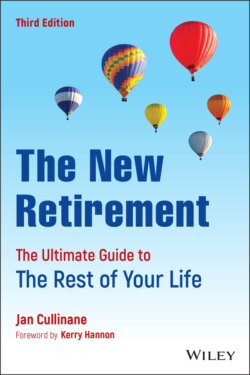Читать книгу The New Retirement - Jan Cullinane - Страница 21
Secret 2: Renegotiate Roles/Cultivate Resilience
ОглавлениеThere are two chief ways of looking at the world, according to research, that increase the chances for smooth sailing through the transition to retirement: having both an internal locus of control (the belief that outcomes are under one's control), and retirement self-efficacy (the belief or self-confidence that one can cope with the changes retirement brings). Adopt these mind-sets to help ensure a satisfying retirement.
Retiring can be similar to your adolescent years, exciting, but at the same time, often turbulent. Leaving your primary career/job results in shifts in thinking – about time, wants and needs, relationships, perhaps where you live, and thoughts about this “third age” of your life. It's time to concentrate on the present and future – your past doesn't need you anymore! Prior to retiring, if part of a couple, you may have worked out patterns or divisions of labor that worked for you – from making meals to taking out the garbage to washing the dishes to food shopping to doing the laundry to supervising work done around the house to yard work to taking care of children and/or assisting your parents … you get the idea. Now is the time to reconsider and to renegotiate these roles. If old patterns still work, great. If not, it's time to discuss which ones need to be changed or renegotiated.
Author C.S. Lewis said, “You can't go back and change the beginning, but you can start where you are and change the ending.” Lewis is talking about resilience, which is the ability to bounce back after adversity. It's an important ingredient in the recipe for a successful retirement, whether single or coupled. You can cultivate this desirable quality by accepting that change is part of life; by concentrating on changing adverse circumstances that can be altered; by acting decisively rather than wishing problems would just disappear; by maintaining perspective; and by taking big problems and breaking them into smaller, manageable challenges.
It can be beneficial to talk to friends and relatives about their own shifts to retirement. For example, although my friend Carol loves to cook, she hated doing the dishes, but felt it was her “duty” to do them since she did not work outside the home. Now, Julian is doing the dishes, and they do the food shopping together, which they both enjoy. A small but important change. Ramona and Carlos were having a difficult time adjusting to “too much togetherness.” They pulled out their 1992 copy of The Five Love Languages by Dr. Gary Chapman, and reviewed and discussed which of the ways they liked to “receive” love: acts of service, gift-giving, physical touch, quality time, and words of affirmation. Carlos was doing lots of repairs around the house he never had time to do while working, and although Ramona was pleased with his “acts of service,” she really craved words of affirmation. Ramona liked surprising Carlos with little gifts, but he was really hoping for her to initiate sex … discussing what they wanted and needed went a long way toward smoothing the adjustment to an almost 24/7 togetherness.
You could also consider consulting with a counselor or couples' therapist or life coach, and/or attending retirement seminars, particularly if they address more than just financial issues. Think of redefining/renegotiating roles as a process, and gradually build that muscle called resilience. The process of adapting to retirement can be more like slowly turning a dimmer on a light rather than flipping a switch.
Pertinent Quote: “I was used to having a large team to whom I could delegate many of the things I didn't like to do; my husband would say that after I retired, I sometimes treated him as if he were one of them.” – Linda R.
